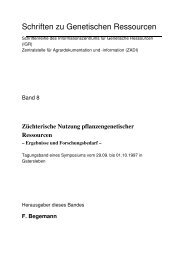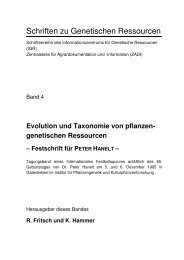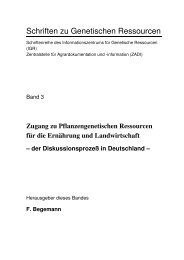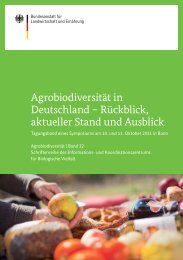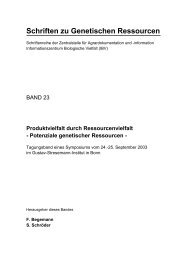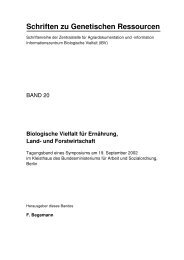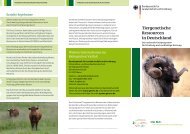Integration of Conservation Strategies of Plant Genetic ... - Genres
Integration of Conservation Strategies of Plant Genetic ... - Genres
Integration of Conservation Strategies of Plant Genetic ... - Genres
Create successful ePaper yourself
Turn your PDF publications into a flip-book with our unique Google optimized e-Paper software.
or several lead institutes take on the responsibility to develop and maintain the European database<br />
for a species or group <strong>of</strong> species as a contribution in kind to the programme.<br />
An important role for the European databases and working group members will be to ensure that<br />
concrete steps are taken to increase the use <strong>of</strong> germplasm in collections. A key function <strong>of</strong> the<br />
databases is to analyse the data they contain so that working groups can take the necessary action<br />
to ensure that all unique accessions are duplicated, that primary responsibility for regeneration and<br />
long-term conservation is assigned to individual genebanks, and that measures are taken to reduce<br />
redundant duplication.<br />
Although the working groups recognise that they may lack specific expertise in in situ<br />
conservation, nevertheless the members' broad knowledge <strong>of</strong> crop genepools represents an<br />
invaluable resource that can be drawn on in the formulation <strong>of</strong> integrated conservation strategies<br />
for particular species and groups <strong>of</strong> species.<br />
Role <strong>of</strong> Country Coordinators<br />
The Country Coordinators will continue to represent the ECP/GR to sponsoring Ministries and<br />
also act as a liaison point between IBPGR, Ministries and participating institutes. An important<br />
task is to maintain close contact with working group Chairmen or members to monitor progress<br />
and identify potential problems with databases and collections.<br />
It is the responsibility <strong>of</strong> the Country Coordinators to obtain the necessary government<br />
commitment to the programme in general and more particularly to ensure that the required<br />
support is provided to institutes to allow them to make the contributions in kind (maintenance <strong>of</strong><br />
databases, maintenance <strong>of</strong> collections, collecting, etc.) which are the basis <strong>of</strong> the success <strong>of</strong> the<br />
programme.<br />
Role <strong>of</strong> IBPGR<br />
As mentioned previously, it has been found that an input <strong>of</strong> one quarter <strong>of</strong> the time <strong>of</strong> the network<br />
coordinator was insufficient. A full time coordinator would allow the secretariat to better respond<br />
to the requests <strong>of</strong> working groups and would allow increased activity in terms <strong>of</strong>:<br />
• support to the working groups and closer interaction with them between meetings<br />
to ensure that the planned activities are kept to schedule<br />
• technical support to national programmes<br />
• information gathering and distribution<br />
• ensuring full complementarity with other initiatives, especially that <strong>of</strong> the EC.<br />
• assisting in formulation <strong>of</strong> proposals for joint activities and in identifying partners<br />
• searching for donors to support particular elements <strong>of</strong> workplans, especially for<br />
eastern European countries<br />
• linking with other regions<br />
• contributing to raising public awareness <strong>of</strong> the importance <strong>of</strong> PGR conservation.



